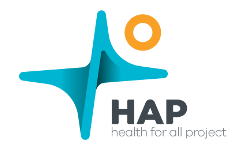
Caring for the elderly requires more than medical expertise — it demands empathy, consistency, and coordinated support. Dr. Ariana Hylviu has worked for nine years as both a family physician and the Director of the Golem Socio-Health Centre, Kavaja, which provides services to around 13,500 residents. In this interview, she shares her insights on the main challenges in elderly care, the impact of recent professional trainings, and the importance of teamwork in ensuring dignified and comprehensive care for the elderly.
The daily challenges of caring for the elderly
“Many of our elderly patients live alone, without sufficient social or psychological support.”
Dr. Ariana Hylviu: The main challenges we face are linked to the fact that the elderly not only suffer from multiple chronic illnesses but also experience a decline in their ability to carry out daily activities. This situation is compounded by social circumstances — many elderly people live on their own and lack adequate social or emotional support, even though they need ongoing rehabilitation and care.
Under such conditions, we often face needs and expectations that go beyond the capacity of the health centre and are not entirely within our control to meet.
Training that transforms care
“Our care has become more comprehensive, personalised, and effective.”
Dr. Ariana Hylviu: Training in the implementation of the Manual for Elderly Care in Primary Health Care Centres, including participation in the Peer Group, has greatly enhanced our professional abilities. We’ve learned to identify early functional deficits, both physical and mental, and to analyse their causes in order to choose the most suitable interventions for each individual.
Equally important has been the focus on preventive measures to slow further decline, and on psycho-social support for both patients and families — all of which have made our approach to elderly care more holistic and compassionate.
Practical tools that make a difference
Dr. Ariana Hylviu: The clinical decision-making tools for Comprehensive Geriatric Assessment and for addressing common geriatric syndromes have proven highly applicable in daily work — both at the centre and during home visits. These include:
- Fracture risk assessment and the OST formula for osteoporosis;
- Screening for depression and other mental disorders;
- Polypharmacy assessment to avoid harmful drug interactions;
- Daily functioning tests (ADL/IADL) to measure independence;
- Home safety and fall-risk assessment to offer tailored advice.
By using these tools consistently, health personnel are able to make informed, data-based decisions, ensuring more proactive and effective care.
Practical challenges in implementation
“Managing polypharmacy remains one of our greatest challenges.”
Dr. Ariana Hylviu: Despite their usefulness, these tools require time and teamwork. Managing multiple medications safely is complex, and preventing falls or fractures often needs a coordinated, multidisciplinary approach.
Early detection of depression and dementia is another challenge, due both to limited consultation time and to the reluctance of some patients to share their symptoms.
Addressing these challenges is key to improving the quality of life of our elderly patients.
The role of the Health Education Manual
“The manual helps us structure conversations with the elderly and their families.”
Dr. Ariana Hylviu: The Health Education Manual for the Elderly is now a core resource in our daily practice, both during consultations and home visits. It guides discussions on:
- Healthy nutrition and light physical activity;
- Home safety and fall prevention;
- Mental health and social well-being.
It has become a practical tool that helps both staff and patients communicate more clearly, ensuring that advice is structured, practical, and easy to understand.
Empowering nurses and teamwork in elderly care
“Elderly care requires an entire team — not just one professional.”
Dr. Ariana Hylviu: Training and peer group sessions have greatly strengthened the role of nurses. They now identify functional and cognitive changes earlier, report them promptly to family doctors, and actively contribute to developing care plans.
Nurses also play a crucial role in educating and supporting family members, providing clear guidance and monitoring their progress. Their approach has become increasingly preventive, promoting proper nutrition, activity, medication safety, and fall prevention.
This has made elderly care more proactive, coordinated, and centred around both the patient and their family.
Priorities for future training
Dr. Ariana Hylviu: Future trainings should place greater emphasis on mental health, particularly early identification of disorders and psycho-social support for patients and families. Other important topics include common paediatric conditions, to strengthen community health education, and early cancer screening, to encourage regular check-ups and specialist referrals.
The need for stronger collaboration with the social service
“To provide truly comprehensive care, we must strengthen cooperation with social services.”
Dr. Ariana Hylviu: In addition to the use of clinical tools that support diagnosis, more effective follow-up, and counselling of the elderly and their families, closer cooperation with social services would help ensure more effective management of complex socio-economic cases. This kind of joint support would make it easier to implement training in practice and provide elderly patients with the continuous, integrated care they deserve.

